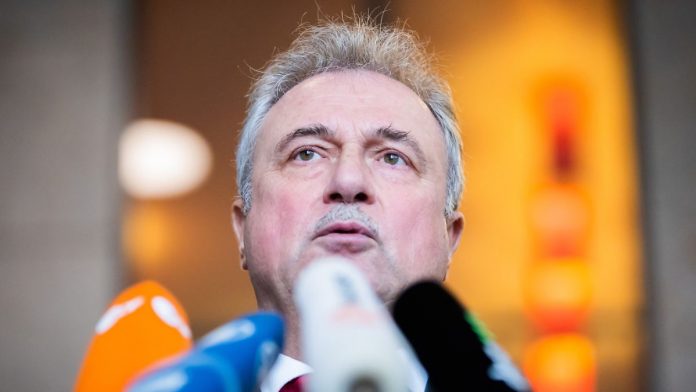Claus Weselsky and his GdL brought rail traffic in Germany to a standstill, insulted corporate executives and tested the patience of passengers. Instead of compromise, he opted for confrontation – and was a resounding success.
Liars, losers, idiots – Claus Weselsky has a long repertoire of insults for the Deutsche Bahn board. There is probably a lot of relief there that the long-time head of the German Train Drivers' Union (GDL) is retiring. The union in Dresden has elected the previous board member Mario Reiß as its new chairman. Weselsky is not running for re-election.
For Weselsky, personal attacks were a popular means of rhetorically accompanying wage negotiations and gaining the upper hand in interpretation. This was particularly important because the GDL, with Weselsky at the helm, quickly escalated wage negotiations and swept Germany with strikes, thereby getting on passengers' nerves and damaging the economy.
Weselsky never tired of emphasizing that his GDL was never responsible for strikes, but always the railway board, which Weselsky then accused of being incompetent and of being paid lavishly for it. In his view, strikes were always self-defense, which the GDL was forced into. Weselsky's strategy: maximum confrontation, maximum demands, in order to get the maximum out of it. And it was undoubtedly successful. As his last major project this year, he pushed through the gradual introduction of the 35-hour week for his train drivers. This was preceded by the longest railway strike in recent history.
Weselsky always stressed that a union had the right to conduct tough industrial action and that strikes were a legitimate means of wage disputes. The fact that the GDL, as a relatively small union, could hold an entire country hostage suited Weselsky well. This gave him the perfect leverage to put pressure on the railway board – and the GDL is now one of the most visible and powerful unions in the country.
“Holy War”
His aggressive negotiating style has sometimes led to calls for the Saxon to resign – he is even controversial in union circles. As a rule, only the boss speaks in front of the cameras. His deputies, including his successor Mario Reiß, can only stand by and look grim. Internally, critics repeatedly accused him of making “lonely decisions”. “He acts as if he were calling for a holy war. Just to boost his ego,” said his predecessor Manfred Schell – also a tough negotiator. He compared Weselsky's leadership style in the GDL with that of the dictators Mao Zedong and Bashar al-Assad.
But his success as a negotiator makes Weselsky untouchable. He became famous in 2007 when the then boss Schell left for a health resort on Lake Constance in the middle of the heated phase of the industrial dispute. At that time, Weselsky showed that as a negotiator he uncompromisingly represented the position of the train drivers. The result achieved after months of dispute in early 2008 was impressive from the GDL's point of view: eleven percent more pay. A few months later, the members of the train drivers' union elected Weselsky as Schell's successor – with 90 percent of the vote.
Weselsky, now 65, is a trade unionist through and through. The Dresden native was there when the GDL was founded in East Germany and became chairman of the Pirna local group in 1990. Two years later, the trained train driver left the tracks: he worked for the GDL from the office as a personnel and works council member, and from 2002 he was completely released from his duties as a trade unionist. In May 2006, Weselsky was promoted to vice-chairman of the GDL. Weselsky was a train driver himself for a long time, and before that a locomotive mechanic. As a left-wing pop star of the working class, however, he is only partially suitable as a CDU member.
But there is always a hint of class struggle in his attacks on railway executives – he railed against “idiots” in the railway tower who “sit on their high horse” and line their pockets – at the expense of the hard-working workforce.
“Overexploitation of health”
However, the railway board also made it easy for the GDL boss. Weselsky's statement that the company has been operating “on the verge of chaos” for years is quite accurate. The infrastructure is dilapidated, the delays are unreasonable. The board nevertheless received bonuses in the millions. Against this background, the fact that a union wants to use force to enforce maximum demands fits in with this corporate culture.
All of this is happening against the backdrop of another conflict that the GDL is waging. It is fighting to expand its influence at the railway. The much larger proportion of railway employees are organized in the EVG union. In the fight for members, the GDL is determined to get more than the competition.
Weselsky resisted the call of money – in 2007 he turned down an offer to become head of human resources at Deutsche Bahn. His conclusion after 16 years at the top of the GDL? “What I did over the years was to destroy my health,” he told “Spiegel”. “I'm looking forward to having more time to keep fit – mentally and physically. Otherwise life doesn't start at 66, it just clicks – and suddenly you can't enjoy anything you've created for yourself.”


